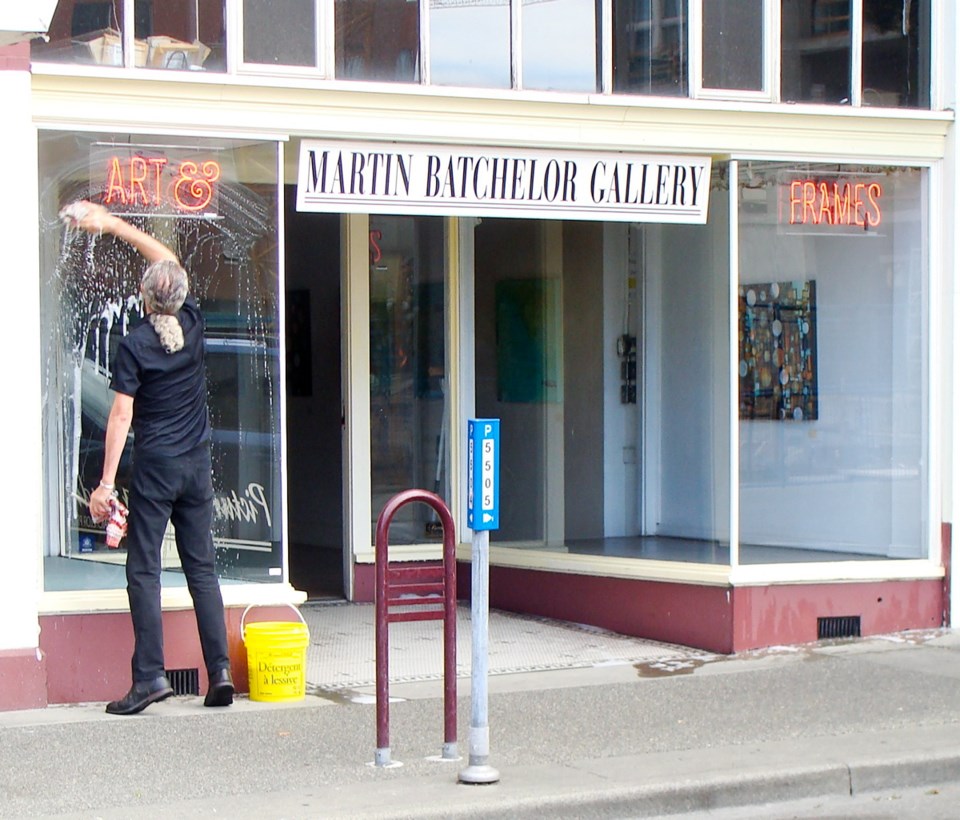 Some are here, more are no more. For 32 years, I’ve been walking the streets of Victoria, peering into art galleries looking for stories to share with you. Some ventures have survived, others live on only in memory; in this column, I am combining the two. Current galleries are shown in bold type.
Some are here, more are no more. For 32 years, I’ve been walking the streets of Victoria, peering into art galleries looking for stories to share with you. Some ventures have survived, others live on only in memory; in this column, I am combining the two. Current galleries are shown in bold type.
Beginning with Carr House at 207 Government St. I go north and pass Holland House Inn, once Lance Olsen’s “art hotel.” The Royal British Columbia Museum anchors the harbour, and I might go left to the Robert Bateman Centre or right to the Crystal Gardens Gallery. Across from it on Douglas in the Conference Centre is Out of the Mist, and next door was the Stephen Lowe Gallery. Tony Hunt’s Arts of the Raven was up Douglas in the Sussex Hotel, and the Community Arts Council had offices there.
Over at Humboldt and Government were Art Bank, Customs House Gallery and Art Underground, and across the street stands Canadian Impressions. Nearby Nootka Court — or is it Windsor Court? — is the Maritime Museum’s storefront, and the former Potter’s Wheel and La Rosa Galleries. Gordon Street was home to Eagle Feather, just around the corner from Mercurio. View Street once had Winchester Modern, Caswell Lawrence and Couch Gallery.
Down on Wharf Street, I lament the loss of the B.C. government’s Emily Carr Gallery (1107 Wharf). Strolling through Bastion Square (Gallery Boehme, Ronin Gallery, Leafhill Gallery, Maritime Museum), I circle back to Fort Street, beginning with the Northwest Coast Institute of the Arts (later Victoria College of Art) and Open Space (home of Photo Secession Gallery). Then it’s up to Government Street to take in Val Pusey’s Northern Passage and the Roy Vickers Gallery. Above Murchies’ was the Beatrice Jumpsen Gallery and, briefly, Carla Levinson’s 1248.
The corner of Government and Fort had Joan Bomford’s the Quest, and Alistair Macduff’s Gallery of the Arctic. The south side of Fort still has Alcheringa and the new Winchester Downtown. Across the street, where the Eaton’s Centre is, Allan Edwards developed the Green Dolphin in the 1960s, and when the centre was built there were galleries on the third floor.
Antique Row, as it was called, began with the Museum Shop and Pacific Antiques, followed by William Dennis Fine Art and Miss Toppyn’s Antique Shop. The apARTment is still there, near the former Point Gallery in Ego Interiors and a gallery called Whimbrell. Beyond Vincent Rickard’s former Open Pacific Graphics, Lund’s Auctioneers remains a mainstay, though Shawn Shepherd’s Polychrome is no longer across Fort. Almost at Cook was Eliza Hawkins’ Vanity Fair. East on Fort was Kilshaw’s Auctioneers (now on Langley), then Ancestral Journeys (where I discovered Susan Point) and the elegant Robert Vanderleelie Gallery. Carla Levinson’s gallery was at 1248 Fort, and on Moss Street the Art Gallery of Greater Victoria remains — despite its best efforts to move. Paul Kyle’s Gallery held down the junction of Fort and Oak Bay, then became the first Winchester Gallery, and is now a cannabis store.
Back downtown along View, you can still visit West End Gallery, Madrona Gallery and Trounce Alley Gallery. In the first block of Yates were the original Jimmy Wright gallery, the Victoria College of Art Gallery and the Sculpture Gallery. A gallery called DV8 was in Waddington Alley, and a short walk to Market Square led to a gallery of holography and Rogue Gallery, before it moved to Eaton Centre, and then became Deluge on Yates, two doors from Michael Williams’ Legacy Gallery.
Chinatown has long been the artist’s neighbourhood. Down on Store Street I used to visit Fran Willis Gallery upstairs and, downstairs, Out of Hand Craft Gallery. Next door was the Gold Room at Swan’s Hotel and Pub. Heading east on Fisgard was Dales Gallery (which continues as Fortune Gallery) and Stephen Sham’s Tiki Gallery. Fan Tan Alley had the Gerard Gallery, and Sandra Merino’s pottery studio. On Government near the Gate of Harmonious Interest was K.C. Tebbutt’s Gallerie Untitled (where Norval Morrisseau hung out). Next door was Quin gallery, after Paul Quin moved in from Maples Gallery at Brentwood Bay.
Bente Rehm’s Pandora’s Box, on Pandora, came and went in the early 1970s. For years the upper lobby of the Macpherson Playhouse was a display space. North of Fisgard on Government was Mirari, preceded on that block by Robert Kidd’s Stones Gallery. Around the corner May Ip had her own gallery, and at 666 Herald St. was Gallery 666. The City Hall held art shows, across from the Barton-Leier Gallery, which was on Cormorant Street. It’s now Martin Batchelor Gallery. Also on Comorant was Wee Chong Tan’s Museum of Ancient Chinese Culture.
More galleries beckon from further afield — Xchanges (now in its fourth location), and the Marshall Gallery and the Titan Embassy on Cedar Hill Cross Road. Memories of the University’s Maltwood Museum (now in a reduced form) linger over the horizon, with Sidney’s Peninsula Gallery in the far distance.
And then there is Oak Bay. The Backroom Gallery on Oak Bay Avenue held Colin Graham’s first show. Luz Photography gallery and studio was also there, and then moved to Rock Bay. When the co-op gallery in Fernwood closed, the Gage Gallery artists’ co-operative opened on Oak Bay. Eclectic Gallery is located at Wilmot, the street where Nita Forrest’s Print Box Gallery first appeared. Under the Oak Bay Theatre marquee was Nunavut Gallery, which became Michelle Frost, and is now Avenue Gallery. And just across the avenue is The Gallery on the Avenue. Red Gallery used to be just east of it, within sight of Winchester Galleries.
Undoubtedly there were more. What about North Park Gallery, and Maureen Flanagan’s storefront on View, and the 50/50 Arts Collective, and the Ministry of Casual Living? Who remembers? What’s to come?



